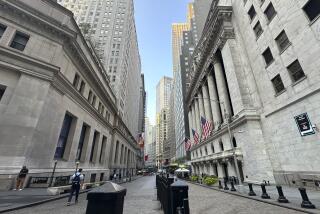Japan Economy Expands at Hot Pace, Report Says
- Share via
TOKYO — In dramatic confirmation of a recovery from the country’s longest post-World War II recession, Japan’s economy expanded at an extraordinary 12.7% annual rate from January to March, its strongest quarterly showing in nearly a quarter of a century, the government said Tuesday.
“The economy is just entering a self-sustaining recovery,” Makoto Kobayashi, vice minister of the Economic Planning Agency, said in releasing the report. “Individual consumption has gained very great momentum.”
Analysts noted, however, that the astonishing growth of the first quarter--which greatly exceeded forecasts--cannot be sustained at such a red-hot pace.
There already are indications of much slower growth in the April-to-June period. Retail sales in April, for example, were down 1.1% compared with April 1995, while early data indicate that overall household spending for April will show only modest growth of 0.5% compared with the same month last year.
Kobayashi also indicated that the government does not expect the first quarter’s torrid pace to continue. But he expressed satisfaction that “there is a good possibility the economy will reach the government target” of 2.5% growth for the fiscal year ending March 31, 1997.
Measured against the last three months of 1995, Japan’s inflation-adjusted gross domestic product was up 3% in the January-to-March quarter, which works out to an annualized growth rate of 12.7%, the Economic Planning Agency said. That helped boost Japan’s real growth rate for the fiscal year that ended March 31 to 2.3%, after three years of near-zero growth.
Personal consumption, housing construction, corporate investment and public-works spending all played key roles in boosting growth, raising hopes for a sustained recovery led by domestic demand.
The economy also was lifted by a special infusion of money from $130 billion in public works projects announced last September, which contributed nearly 1% to the 3% quarter-on-quarter growth, the government said.
Government intervention continued Tuesday when Japan’s Parliament passed into law a $6.3 billion government bailout of bankrupt housing lenders, a politically unpopular measure but one that serves to reassure the international financial community.
Previous Japanese recoveries have often been based on surging exports. But recent shifts in trade patterns, with rapid import growth and falling trade surpluses, meant that in this quarter the effects of trade actually slowed the pace of expansion, the government said.
An extra working day in February, because of leap year, pushed up the January-March quarter-on-quarter growth rate by 0.5%, the agency said.
Japan’s economy began its tailspin in 1990, with a collapse in stock and land prices leading the decline. Growth, according to Economic Planning Agency figures, was 0.4% in fiscal 1992, 0.2% in 1993 and 0.5% in 1994, statistics that in Japan are considered to show a recession.
The sharp spurt in growth prompted immediate speculation that the Bank of Japan may soon start raising the extremely low interest rates that have helped prompt recovery. Market interest rates rose immediately after the announcement, while the dollar fell to about 108 yen late Tuesday afternoon from 109 yen in the morning. The yield on the benchmark 10-year Japanese government bond rose to 3.255%, up 0.055 point.
But Bank of Japan Governor Yasuo Matsushita told reporters he sees no need to change the easy credit policy.
Chief Cabinet Secretary Seiroku Kajiyama, the government’s top spokesman, also expressed caution, voicing satisfaction at the growth data and commenting that “we would be thankful if the trend takes root.”
On the Tokyo stock market, which closed Tuesday before the growth figures were announced, the widely watched 225-issue Nikkei index hit a high for the year, closing at 22,332.40, up 87.02 points.
In afternoon trading today the Nikkei was up 146 points to 22,478.40, a new 1996 high, as bond yields held steady despite the growth report. The yen held to about 108 to the dollar.
Tod Wood, an analyst at Baring Securities (Japan) Ltd., said that “sustained growth at even half the current pace would be unusual,” given various factors limiting the economy’s potential, including weak employment figures and slow wage growth. Baring predicts a slowdown later this year, with growth of less than 2% for the fiscal year that ends next March 31, he said.
Corporate capital investment, however, is expected to remain strong. A Bank of Japan survey released earlier this month showed that major firms plan to increase investment by 6% during the current fiscal year.
* MARKET BEAT
A turnaround should begin to restore consumer and investor confidence. D3
More to Read
Sign up for Essential California
The most important California stories and recommendations in your inbox every morning.
You may occasionally receive promotional content from the Los Angeles Times.













